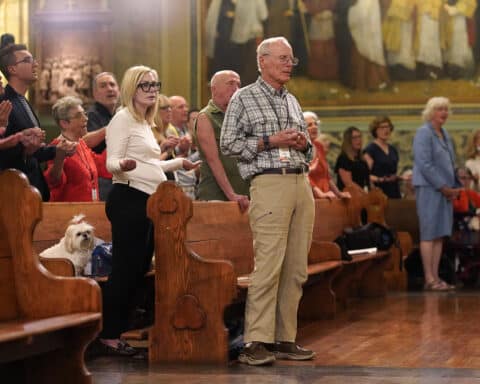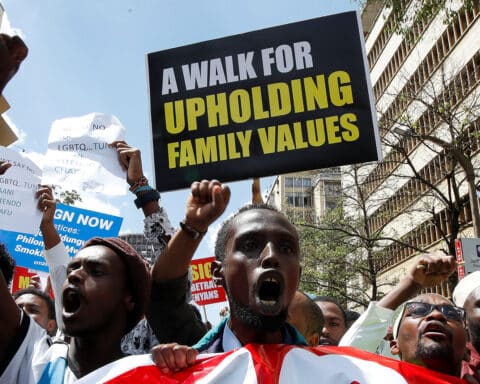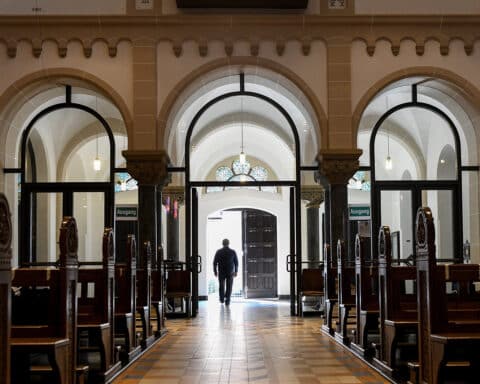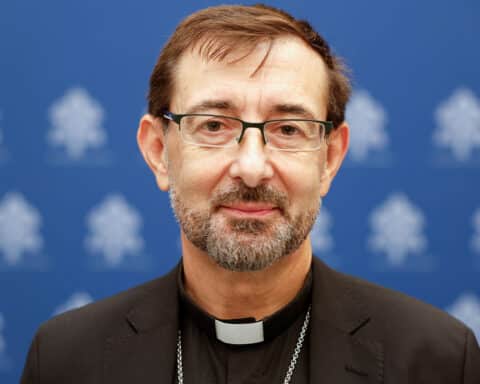
Releasing the document, Cardinal Jozef De Kasal, Belgium’s premier bishop, stated that the Church must love all, be open to all and inclusive. Of course, the Church cannot reject anyone, but the Church shows its love by guiding its members, and inviting all others, to lead lives that include God, produce the peace of discipleship and end in heaven.
It is hard not to say that this new ritual at least blurs ancient Catholic teaching. Same-gender unions are promoted as acknowledging personal rights. The kernel of the situation is the intimacy always associated with marriage. Catholicism, and Judaism which preceded it in God’s plan of redeeming the world, have seen marriage, without exception, as a covenant between one man and one woman. Additionally, in the Catholic concept, marriage is essentially a spiritual function — a means by which spouses can serve God and reach heaven.
Especially worrying, the Belgian decision easily may confuse Catholics, and others, even more as to what marriage is and what intimate, personal relationships are.
What about other situations? Few American Catholics do not know at least someone, maybe in their family, who has not been divorced. Breakups in marriage are so frequent in this country.
The response of the Church is well-known and, frankly, in these times, not uncommonly resented. Persons who were married and later go through civil divorce, depending on circumstances, cannot be married “in the Church,” as they say, until the matter is reviewed and favorably resolved by an appropriate Church office.
These requirements have a purpose. They are not pursued to make anyone miserable, to create red tape, to make money, or to nitpick. They represent a process in which the Church attempts to uphold, not to restrict, the human rights of members, and to protect the dignity, and the responsibilities, of marriage, so that spouses may draw the greatest benefits from marriage, most prized among them the spiritual benefits.
Then is the question of cohabitation without marriage, now a norm in society, increasingly among Catholics. Then what about reproduction?
What is right or wrong in the eyes of God? What is best for people?
Belgium, albeit with its lustrous history of devout Catholicism, is not the only place on earth where traditional thinking about marriage and traditional morality is questioned, compromised or adjusted. Note the demands, indeed in Catholic circles, in this country, appearing in the grassroots discussions conducted as preparation for the forthcoming Synod of Bishops in Rome. Read reports of these discussions, published in many places. Listen to everyday conversation among Catholics. Watch Catholics. Watch Americans in general.
Interesting will be reactions to the new Belgian ritual at higher levels in the Church. Much public disagreement pertains, even in the hierarchy, but already a Spanish bishop has protested. Pronouncements from Church authorities in Rome, not long ago, reaffirmed the definition of marriage and its moral implications.
Before becoming Pope Francis, incidentally, Cardinal Jorge Mario Bergoglio of Buenos Aires was the loudest voice in Argentina raised on behalf of the Church’s ancient teaching on marriage. It made him quite unpopular in many quarters, including the offices of the country’s then president, herself a professing Catholic.
Criticism of the future pope showed a trend well underway, even in Catholic Argentina. Ignore the Church. Redefine morality. Downplay divine revelation. Go along with everybody else. Get in step with the times. Forget the never-failing fact that human nature and its limitations may sway personal preferences and lead to bad results.
FIfty years ago, the late Pope St. Paul VI predicted what happens when such trends develop. He was smart.
Msgr. Owen F. Campion is OSV’s chaplain.





